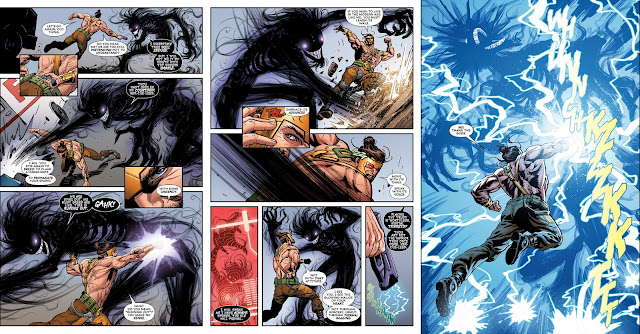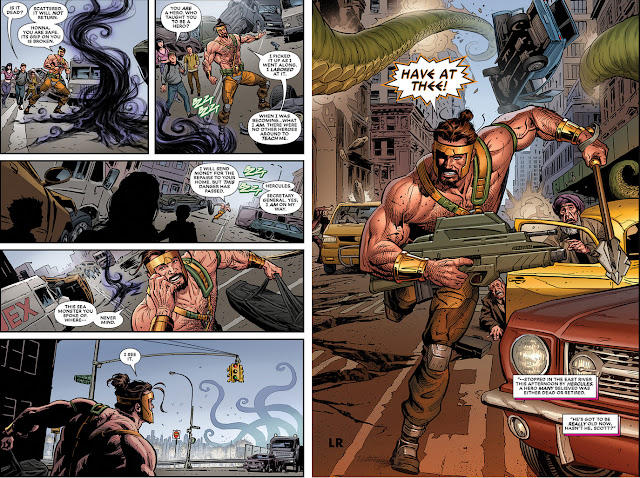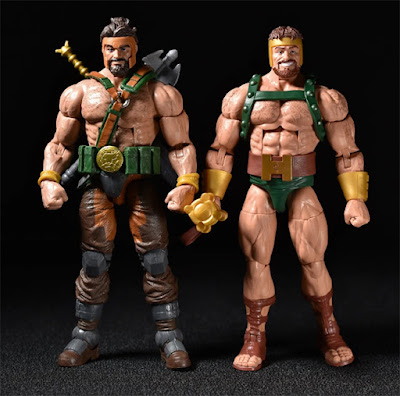There have been so many attempts at providing a solo series to Hercules, the self-designated Prince of Power, that it's easy to discount them, often on sight alone. What will this one bring to the table, we wonder, that could possibly provide some measure of depth to this character that goes beyond his preoccupation with seeking out forms of amusement, a tavern, or, failing that, a challenging opponent? Admittedly, I'm as guilty as the next person, having formed a bare-bones impression of Hercules during the '70s and '80s as an egocentric, brazen god who is easily provoked and revels in battle, wine and song (not necessarily in that order). Yet I took note of artist/writer Bob Layton's attempt to temper him to an extent in no less than four projects--three of them being four-issue "limited series" (the term no longer being used in banner form by that point), and, in 1988, a graphic novel--all written in the spirit of good, obstreperous fun and not to be taken too seriously, a description that might suit Hercules himself when not in the heat of battle.
In 2015, however, I ran across another brief series which sought to turn things around for the character, this time by writer Dan Abnett, and with an ambitious premise that appears to acknowledge that he has his work cut out for him. (A statement that we could apply to both Abnett and his subject.)
And so, having touched on this series previously, let's now backtrack to its first issue in order to see Abnett begin to put in place the pieces that would help to redefine the character for a readership which by this point might have collectively felt certain they knew what they could expect from a Hercules story--expectations that Hercules himself appears mindful of in his approach to dealing with a looming threat older than himself.
The assertion that Hercules was Earth's first super hero is definitely a distinctive bit of trivia that would bolster this reset of the character, given that in the case of Thor that's never really been made clear. In the classic scene where Odin prepares to send Thor to Earth in order to teach him humility, Thor reacts to the image of Earth as if he's never seen that world before, and this was in the early 1960s; yet we know he was present on Earth during the Trojan war, as well as the heyday of Vikings (if briefly) and the ancient Grecians. My guess is that Abnett is simply emphasizing that Hercules has lived through a great deal of Earth history and thus has considerable perspective on the human race and its evolution, which will become pertinent as this story progresses in relation to how he's adapted to those changes.
We find Hercules just as he's begun to make modest inroads toward breaking with his careless past and sordid lifestyle, having distributed unpretentious notices that advertise his services (though we'll also see that the U.N. Secretary General has made a point of pocketing his business card for emergencies). He's also taken in a temporary boarder--Gilgamesh, a former Avenger and hero who has fallen into a rut and whose life Hercules hopes to turn around. We get our first look at Hercules through the eyes of two young boys who could use his help in a domestic situation involving a family member--and the pace Abnett establishes in these introductions helps us acclimate to this new Hercules in a way that we've seldom seen before.
Sophia, Hercules' landlady, appears to be mostly Abnett's mortal-in-the-mix, a sort of grounding character whom we later learn had made Hercules' stay in her building conditional on his staying sober. As for the boys, Akil and Baste, they serve as our gateway into this new avenue of heroism that Hercules wishes to pursue--one navigated not by bragging, but by conversing, which the art of Luke Ross appropriately takes its time examining and brings the reader along, so to speak. I found myself quite drawn into the story, pleased to find a greater degree of nuance to Hercules peeking through that larger-than-life veneer than what I'd experienced in past stories.
But as we soon see, Hercules' wish to help these boys has more to do with his suspicions of what he suspects is the true nature of "Erik," the boyfriend of Akil's sister. Yet what's truly intriguing to see come to light in their eventual conflict is how mindful Hercules is (and perhaps has been, to some degree) of the advantages inherent in someone having lived through the centuries in regard to changing with and adapting to the times on this mortal world.
As Hercules pauses, we're witness to another surprise in his modus operandi, where--rather than bellow his outrage and re-engage with the Urmut with arrogant declarations of his foe's imminent defeat at his hands--he instead takes stock of its motives, and, equally important, its vulnerability to the tools which Hercules the "Prince of Power" would have forsaken in favor of naught but his right arm and trusty mace.
"I have lived lifetimes. I have learned many skills." How true!--and how odd, in retrospect, that this side of Hercules was rarely if ever explored during his time with the Avengers (even by Roger Stern, who regarded the character as an amiable bruiser who took the initiative but for the most part was seldom solicited for his opinion and/or perspective).
The crisis dealt with and reassurances made to those to whom he pledged his aid, Hercules then races to face the other obligation he agreed to fulfill, bringing to a close a public debut which has stunned a good many this day--including the news media, which don't have the benefit of having this issue in hand and, like their fellow New Yorkers, struggle to make heads or tails out of the behavior of this character who now seems to be the epitome of responsibility.
During the events of this day, Hercules has also been "visited" (an apt enough description of the scene) by the goddess Athena--her coming shrouded in mystery, keeping silent in response to Hercules' many queries as to the reason(s) behind her appearance. Something to ponder further as the day winds down for him and he again turns his attention to his couch-settled friend, Gilgamesh, even as he mulls a suspicion that the Urmut may be a portent of a greater threat yet to be faced. In a sense, Hercules and Gilgamesh are perhaps two sides of the same coin (Gilgamesh, an Eternal, having been mistaken for Hercules during his own past adventures in ancient times), the latter now facing a future of irrelevance which nearly claimed the former but, unlike Hercules, seems resigned to such a state.
If Gil can be pried off of his couch, Abnett's story, "Still Going Strong," could be on its way to redeeming two heroes in the eyes of its readers.
alongside the Hasbro vintage Hercules figure (sandals and all).


















8 comments:
This era of Hercules was great! I, as the saying goes, gobbled it up with a spoon.
I went into it with much trepidation, fearing it would be some lame-wit idea of making a "film noir" Hercules. (forcibly restraining a side-rant about feeble-talented hacks thinking "grit and grim" is really creative)
But it was not! There was humour, but danger. The old, boisterous Hercules trying to "grow up". Self-learning some humility and calm without the extreme benefit/curse of a "Donald Blake". The story became epic in very mythological way. Some guest starring Avengers gave us some delightful insights in how they regarded their Olympian ally. The supporting cast of friends and allies was marvellous.
So, this Hercules would get my vote. He's still our gregarious, romping god but now with a little nuance and depth.
AND HE WORE PANTS!
This may reveal a latent prudish tendency in me, but Hercules (and even more so Namor) walking around in skivvies next to Thor in full cape and costume just looked...SILLY.
I haven't kept up on Namor's costume changes to date, Murray--did he revert to the classic look or decide to keep some variation of the costume design as originally produced by Reed Richards? I'd be curious to hear his reason(s), either way.
I haven't a scholarly study of Namor's current costumes. I only know him from guest appearances in Agents of Atlas. (A source of knowledge dwindling in the rear view)
In A of A, he wore artistic variations of that "Reed Richards" suit, only missing the yellow underarm glider vanes. A quick image search of the web show this still seems to be the case, in very broad terms. And as per my babbling above, it is a look I heartily endorse.
Why? I'm going to guess nothing but aesthetic fashion choice.
I also notice in that web search that a lot of newer art seems to be based on the "Aztec" look of Namor's appearance in Black Panther II
I stopped buying superhero comics by the time this Hercules series came out so cannot comment on its merits. But my favorite depiction of him remains Roger Stern's run on Avengers. He served the heavyweight role quite well, but distinctly from characters like Thor, Hulk, or the Thing.
As a Marvel character, Hercules has always been hard. The character was always less the Greek hero/demigod of mythology, and more that of a generic sword and sandals hero based on the old Steve Reeves movies. He was also often redundant - he was the character who filled Thor's role in the Avengers when he was absent from the team. Most characterization was simply based on that need.
I never liked the Bob Layton Hercules stories. Layton had strengths that were put to good use on Iron Man and some other titles, but I thought his Hercules in the future stories were lackluster and generic. A poor version of a Jim Starlin story that did not make good use of the signature elements of Hercules. None of Marvel stories by that point made good use of the signature elements of Hercules to be fair, but if you are going to do a solo title that is where you need to go for inspiration.
That should include the ideas from myth like: 1) Hercules may be the son of Zeus, but he was a mortal and knows what it is like to be human, 2) he was the foremost hero of the ancient world and travelled widely, 3) he performed amazing feats that required not just brawn but wits & ingenuity, and 4) he slew monsters, lots of monsters.
But besides myth, you also have to consider his role as one of the top strength based heroes in Marvel. Someone with strength comparable to Thor, Hulk, etc. requires a certain kind of story, foes, and treatment. You cannot treat him like a Spider-Man, Daredevil, Power Man, etc. The stakes need to be higher.
At least based on what you shown, the Abnett series seems to have picked up on many of these. Good for him. But I'm leery because it seems it may be settling for too low stakes and too generic monsters. You have to take those concepts and make them good for superheroics like how Kirby would do it. Also, is that Gilgamesh supposed to be the Eternal the Forgotten One? It's a bad use of him. As an Eternal, he would be well acquainted with all sorts of technology far in advance of any tablet or smart phones. And the idea that he is somehow unwanted and unneeded is bizarre. But perhaps Abnett is working on some established continuity.
Chris
Gilgamesh is no stranger to feelings of isolation or being shunned, Chris, since he is indeed the Forgotten One of the Eternals as revealed above. Follow the link provided to get a little more background on the character.
Kudos to Joe Sabino, who lettered this issue, for some first-rate font work. The seamless transition in and out, when Hercules decides to "speak as thou speaketh, in the old" to the Urmut, was especially well done.
It's funny you should mention the difficulties in both writing Hercules as a character with both purpose, and sufficient stakes/presence distinct from other powerhouse heroes like (particularly) Hulk.
I'm not familiar with the Bob Layton Hercules stories, personally. But Abnett's stint writing the character was preceded by an extended run by Greg Pak (in collaboration with Fred van Lente) that really laid the groundwork for Hercules' evolution into... well, a modern hero, but more fundamentally just a modern-day character, period. (Not to take anything away from Abnett, who capably built on the foundations laid by Pak & van Lente. Plus Christos Gage, who brought Herc over to Avengers Academy for a few issues in between the end of the Herc comic and the launch of Abnett's Hercules.
Pak & van Lente's run was interesting, though, because it grew out of World War Hulk, and of Hercules and Amadeus Cho working together as some of the only friends Hulk has left on Earth, while at the same time recognizing that he's gone too far and trying to end his rampage before he or anyone else gets killed.
Afterward, Herc sort of... replaces Hulk. And I mean that in every sense of the word. The Incredible Hulk, which Pak was writing at the time, was literally renamed to The Incredible Hercules from issue 113 onward. Amadeus (who, apparently, comes with the book?) pulls a Rick Jones and also starts following Herc instead of Hulk, since the latter is unavailable due to his post-world-domination-attempt timeout.
If it all sounds very weird, that's because it absolutely is, but in a way that feels very deliberate and metacontextual. Pak uses the weird circumstances to tell a story about the stories he's telling, as well as to fuel plenty of resentment and wounded pride down the line. Particularly between Amadeus and both Hulk and Herc. (All this drama is probably even part of the impetus for Amadeus' transformation into the Totally Awesome Hulk.)
Oh, and along the way Herc's rivalry with Ares is renewed and brought center stage, and he's constantly being either assisted, manipulated, undermined, or outright assaulted by various members of the Greek Pantheon — self-reinvented as the movers & shakers at the helm of the Olympus Group, a particularly cynical foray into the world of 21st Century corporate capitalism. (IOW, the stakes are more than adequately elevated.)
FeRD, The Incredible Hercules has been on my list of review titles for some time, mostly because I tend to simmer whenever I think of Hercules and his little group of friends trying to have their cake and eat it too in regard to essentially adopting a nonaggression pact during the Hulk's sudden turn toward revenge while turning a blind eye to the collateral damage, thanks in part to the misguided Amadeus Cho. To that end, Hercules takes his place on the book's masthead so that it can assume a holding pattern which leaves the Hulk free to not simply dominate the comics racks in World War Hulk, but to become someone that readers of his own book wouldn't recognize. After so much time has passed, though, it's going to require sitting down and poring through those stories to refamiliarize myself with it--and frankly, I'm not sure how to do that while trying to avoid ripping each issue to shreds! :D
Post a Comment